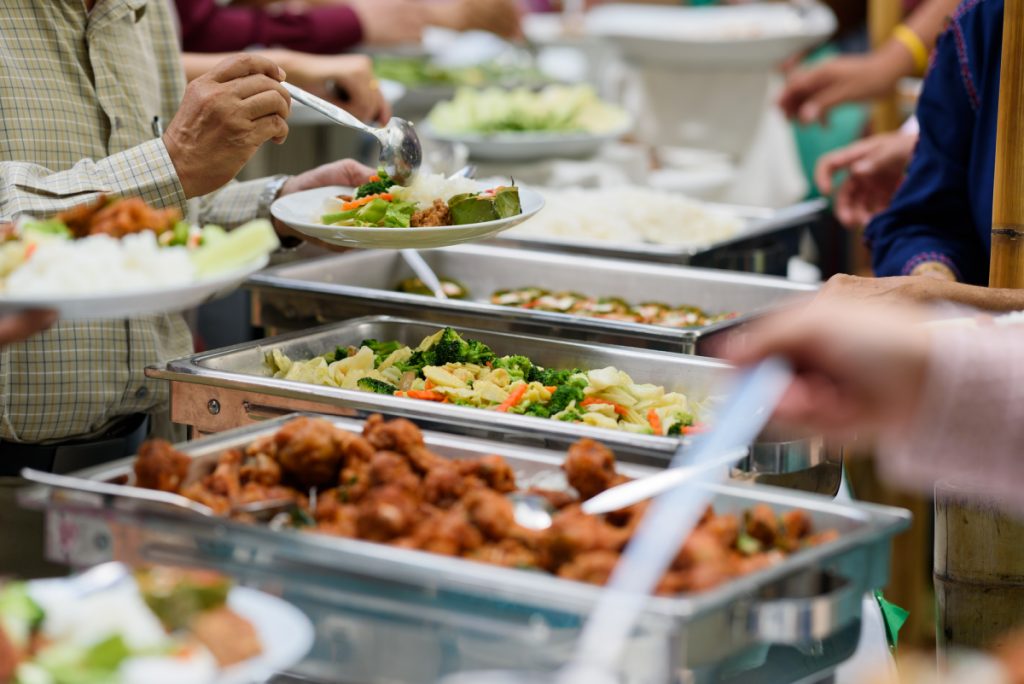Have you ever been to an event and thought, “I could serve better food than this?” Whether at a wedding, a corporate event, or a special celebration, the quality of the food – or lack thereof – can make a lasting impression. And it all comes down to the catering. But establishing a successful, high-quality catering business can be much harder than it looks.
Catering businesses stand distinctively apart from other business models in the food and beverage industry. They provide more than just food; they deliver an experience. Functioning in diverse settings, from intimate gatherings to grand banquets, these ventures are often the silent heroes making events memorable.
Whether you’re an aspiring caterer, an industry professional seeking fresh insights, or simply curious about what happens behind the scenes, this exploration promises a flavorful and educational experience.
This article delves into the intricate web that forms the catering business model as well as the benefits and drawbacks.
The Catering Business Model Explained
What is catering? Catering is food service offered beyond the limits of a restaurant. The locations where your food is served can be limitless. Caterers serve food at weddings, festivals, birthday parties, corporate meetings, and other special events.
Catering, though, is more than just about providing food. Because catering doesn’t happen at a restaurant, caterers often have to do a lot of planning to make sure the overall experience of each diner is a good one. This includes making sure the food is served on time, at the right temperature, at the right location, and to the right people.
Catering can be considered part of event planning. Caterers may work with other event professionals, such as wedding planners, to make sure a client’s day is exactly how he or she envisioned it.
Caterers need good communication skills for speaking with their clients and other members of an event planning team. This is important if your food is being served at a party, a funeral, a prom, or any other event.
Whether you already have a business working with food, or you’re thinking about starting your first business from scratch, there are a few things you’ll need to be a successful caterer.
1. You’ll Need a Good Staff
Any catering business must have good, reliable staff. This remains true whether they’re creating food or serving it. 30% of catering companies have between 1–10 full-time staff.
You’ll need staff that is skilled with food prep. And, as more and more customers are demanding food that meets their dietary preferences and allergies, serving up accuracy is important, too.
Providing positive first impressions is a must. Your catering business will need to offer excellent customer service. Will your servers be free to wear what they want, or will they wear uniforms? The choice is yours, but you’ll need to ensure they represent your company well.
In particular, staff that work for a catering service should be extremely reliable. Unlike restaurants, caterers often supply food for events that are “once-in-a-lifetime.” Clients will be scrutinizing these events, and any staff shortages will show in customer dissatisfaction, including customer reviews.
2. Training Your Staff May Be Time-Consuming
Training staff is paramount to the success of a catering business. It equips employees with the essential skills to perform their roles efficiently This includes things like food preparation and customer service. Training fosters consistency. It also ensures that every event is executed with the same level of quality and professionalism.
In the same way, it ensures adherence to food safety and hygiene standards. Protecting client health and the company’s legal compliance is crucial. The last thing you want your catering business’s reputation to be is the caterer that made everyone sick at the wedding.
In an industry marked by high-pressure environments and complex logistics, a well-trained team is more adaptable, can handle challenges on the spot, and provide seamless service. Given the industry’s high turnover rate, continuous training helps maintain service standards despite staff changes.
Here are some things that you should focus on when training your staff:
- Variety of Skill Sets: The range of tasks in a catering business is vast and includes food preparation, serving, cleaning, customer service, and event setup and tear-down.
- Handling High-Pressure Environment: Catering events often involve serving large groups of people within a limited time frame. This high-pressure environment requires training staff to work quickly, efficiently, and accurately.
- Complex Logistics: Catering businesses often operate at different venues with varying facilities and layouts. Training staff to adapt to different environments and to understand logistical requirements for each event is challenging.
- Soft Skills and Professionalism: Staff need to be trained in soft skills including customer service, communication, problem-solving, and teamwork.
- Food Safety and Hygiene: As previously mentioned, staff needs continuous training and reminders about proper food handling, storage, and disposal, as well as personal hygiene.
3. Balancing Food Supply Will Be a Challenge
Because catering businesses serve their food offsite, they face some special challenges.
Not preparing enough food can mean running out of food. Guests can quickly become disappointed when they want to try something, and there isn’t enough to go around. This can leave not only the guests disappointed, but your client disappointed that the experience wasn’t better for everyone.
On the other hand, if you prepare too much food, this can create waste. Waste is costly, and cuts into your profits.
Arriving at a happy medium between these two is one reason why it’s important to carefully calculate what is needed. Being able to better predict what guests will need isn’t something learned overnight, and if you have no restaurant or food industry experience, this can be a steep learning curve.
4. Highly Competitive
If you’re looking to break into the food industry, you may have thought about starting your own home catering business. However, it’s important to be aware that catering is a highly competitive business. There are nearly 30,000 catering companies in the U.S. currently. You’ll need to be mindful of the competition that exists in your area.
On top of small catering businesses, there is also competition from some well-known brands. Large chains with brand recognition – companies like Chick-fil-A, Papa John’s, and Olive Garden – offer catering menus. Locally owned restaurants in your area that are trusted for their take-out service might also have catering menus, too.
Before you try to launch your own service, investigate the options as if you were just a client looking for a caterer. Call different places and find out what they offer. Check out the competition and think about what would set you apart from them. Also, understand the target market for your catering business well. This will help you find a gap in the market where you can establish yourself.
5. Long Hours and Weekends
Catering businesses thrive off evening events. This business requires long hours, and it isn’t for everyone. Holidays too are a preferred time for clients to schedule special parties and celebrations, and caterers who make themselves unavailable during these times will lose a major part of the business.
If you’re starting a catering business, you should prepare yourself for a busy week. You may find yourself doing food prep during the day, and working an event at night.
Along with the intense competition and the time it takes to establish your business, the hours alone can be draining. So, if you don’t completely love this business, then it probably isn’t the right one for you.
Conclusion
It’s important to understand the catering business model before you decide to start your own catering business. After all, catering isn’t just an easy side hustle. Catering comes with a set of unique challenges. Recruiting good staff, balancing the food supply, facing competition, and working long hours are just some of the challenges that catering business owners face.
Also Read:
5 Important Goals for a Catering Business
The Target Market for a Catering Business with Examples















Pingback: 5 Things to Understand About the Catering Business Model – Joseph Odierno Buffalo
Pingback: 5 Things to Understand About the Catering Business Model – Andrea Zanon
Pingback: 5 Things to Understand About the Catering Business Model – Austin Rotter